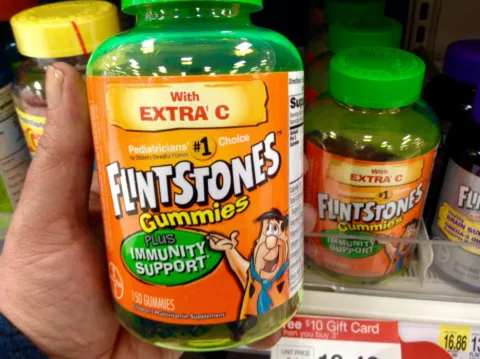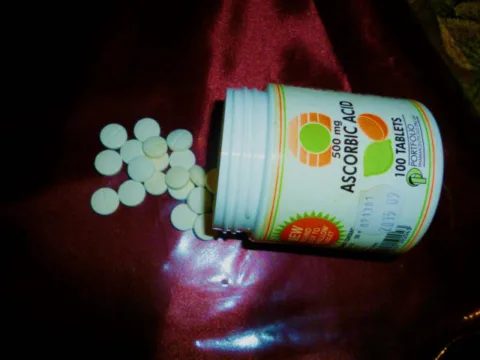Wondering if it’s really possible to take too much Vitamin C?
I’m here to tell you that yes, Vitamin C overdose is a real thing.
One reader asked:
I’ve heard of people overdosing on Vitamin C, yet I can eat a couple dozen Halls Vitamin C cough drops in one sitting without any ill effects. The package states that each cough drop has 100% of the daily recommended dose of Vitamin C. (Each drop has 60 mg of Vitamin C.)
My local pharmacist told me that 500 mg is the daily maximum dosage, but during times like allergy season doctors are more likely to increase that dose to 1000 mg per day.
So… how much is really too much? There are so many conflicting stories out there.
What The Evidence Shows
Things like Vitamin C cough drops and Vitamin C gummies are a great way to boost your Vitamin C when you’re fighting a cold virus.
And you’re right, there are lots of conflicting recommendations when it comes to how much Vitamin C is safe to take in a day.
Most of us don’t think too much about the fact that you can actually overdose on a vitamin. But you need to know that it really is possible to do so! In fact, there can be serious consequences if you take too much Vitamin C.
Here is the Vitamin C dosage information you need to know:
- The recommended daily dose of Vitamin C for non-smoking adults is 75 mg daily for women and 90 mg daily for men.
- For smokers, it’s a little more: 110 mg for women and 125 mg for men.
You may have heard that when you’re fighting a bug, you can take between 1,000 mg and 2,000 mg of Vitamin C daily. In fact, this may be too much!
If you’re wanting to take a higher dose of Vitamin C to lessen the effects of a bug, then the safest recommendation is to take between 200 mg and 1000 mg per day only when you are actually dealing with an infection or a virus. Thus, only for a very short period of time.
In the end, you can can be sure that the recommendation of Vitamin C as stated by the U.S. Dept. of Health & Human Services is your safest option on a daily basis. Their recommendation varies a little bit, depending on age.
Megadoses of Vitamin C are not recommended. Only your doctor can safely advise you to take more than the recommended daily allowance of Vitamin C.
The U.S. Food and Drug Administration puts the recommended dose of Vitamin C between 60 to 95 mg per day. Amounts in excess of 5 grams (500 mg) are considered to be in the overdose range. Most excess Vitamin C is excreted in the urine, and while it won’t kill you, continuous overdosing on Vitamin C can cause several problems. Source
What Vitamin C Overdose Looks & Feels Like
Yes, Vitamin C overdose really does happen.
Depending on the amount of Vitamin C you’ve ingested, the symptoms will vary.
The most common physical symptoms of Vitamin C overdose are:
- Diarrhea
- Stomach cramps
- Nausea
- Other symptoms
Other problems that can occur with Vitamin C overdose are:
- A decrease in copper and an increase in iron in the body.
- In pregnant women, increased Vitamin C in the body can actually cause the baby to get rebound scurvy once it is born.
Common side effects of vitamin C overdose involve the digestive tract. If you consume more than 2,000 mg of Vitamin C, you may develop severe gastrointestinal irritation and diarrhea. In addition to significant discomfort, extended episodes of diarrhea or vomiting can lead to dehydration — causing extreme thirst, fatigue, low urine output, and reduced blood pressure. Diarrhea and vomiting can also cause additional mineral imbalances in the body. Source
Why The Mixed Messages About Vitamin C?
One reason that so many people swear by Vitamin C and there is such misinformation about this vitamin is the fact that Linus Pauling, a Nobel Peace Prize winner, wrote a book that was published in 1970 entitled Vitamin C and the Common Cold.
In it, Pauling suggested that taking 1000 mg of Vitamin C daily would get rid of occurrences of the common cold by 45%, as well as possibly slowing down the beginnings of many cancers.
As a result, products like Emergen-C and Airborne started appearing on store shelves — with mega doses of Vitamin C to help you get through a cold.
But here’s what I mean by mixed messages…
On the plus side, Vitamin C:
- Helps with elasticity of skin.
- Helps the body to absorb iron better.
- Helps to fight infection.
On the other hand, more is not better — as evidenced by what happens when an individual suffers from a Vitamin C overdose!
Vitamin C is water soluble, which means that if you take more than your body can use, the excess is usually excreted without causing harm. However, adverse reactions like diarrhea, stomach cramps, and nausea can occur. In high-enough doses, Vitamin C can cause kidney stones. Any amount larger than 500 milligrams per day can be enough to cause a problem. Source
These days, Mr. Pauling’s statements regarding Vitamin C are being questioned and further investigated by medical researchers.
Better To Be Safe Than Sorry
It’s clear that while the body does get rid of any Vitamin C it doesn’t use (usually through the urine), excess Vitamin C in the body can still cause some serious health issues before the body gets rid of it including:
- Kidney stones
- Vitamin B-12 deficiencies
- Copper deficiencies
- Increased need for oxygen
And with longterm use, here are some of the more severe outcomes of Vitamin C overdose:
- Kidney disease
- Diabetes
- Acute right sided conjunctivitis
- Hypoglycemia
So, while you may think, “Oh, my body will just get rid of whatever it doesn’t need,” keep in mind that long term overuse of Vitamin C can, indeed, cause some very serious health problems over time.
It pays to stick to the recommended dosage of Vitamin C instead. You should talk to your doctor before taking higher doses of Vitamin C for a short-term period when you’re ill or injured.
The Benefits Of Taking Vitamin C
The main advantage of Vitamin C is that it’s an antioxidant — meaning it helps keep the number of free radicals in our bodies down to a normal count. Our bodies always have free radicals (molecules that have an unpaired electron). But if you have too many free radicals in your body, it increases your chances of getting heart disease — and even cancer. So Vitamin C can help to prevent that.
Did you know that doctors routinely prescribe Vitamin C supplements for stroke patients?
You see, there are actually 2 different forms of Vitamin C:
- The Vitamin C that you get from food is in the ascorbic form.
- The Vitamin C you get from supplements is in the deyhydroascorbic form.
The dehydroascorbic kind can cross the blood brain barrier. The ascorbic form cannot.
Since Vitamin C supplements can cross the blood brain barrier and help with the antioxidant levels in the brain, Vitamin C can actually help someone who has had a stroke to recover faster.
Vitamin C definitely has some advantages. And it’s wise to make sure that you are ingesting enough Vitamin C daily. But it’s just as important to remember that, as with most things, taking too much could actually do more harm than good.
More About Vitamin C
In addition to the links I’ve included above, here is some more information about Vitamin C supplements and Vitamin C overdose:
- Do Vitamin C Pills Expire Or Lose Their Potency?
- How Much Vitamin C Is In An Orange?
- Which Vitamins Should You Really Be Taking?
- Do Vitamin Gummies Really Work?
- At What Age Can A Child Take Vitamin C?
My favorite things to write about are topics that have to do with pregnancy, weddings, saving money, living green, and life with dogs. When I’m not writing, I love to spend time with my husband, read, create 3D artwork and Native American beadwork.











